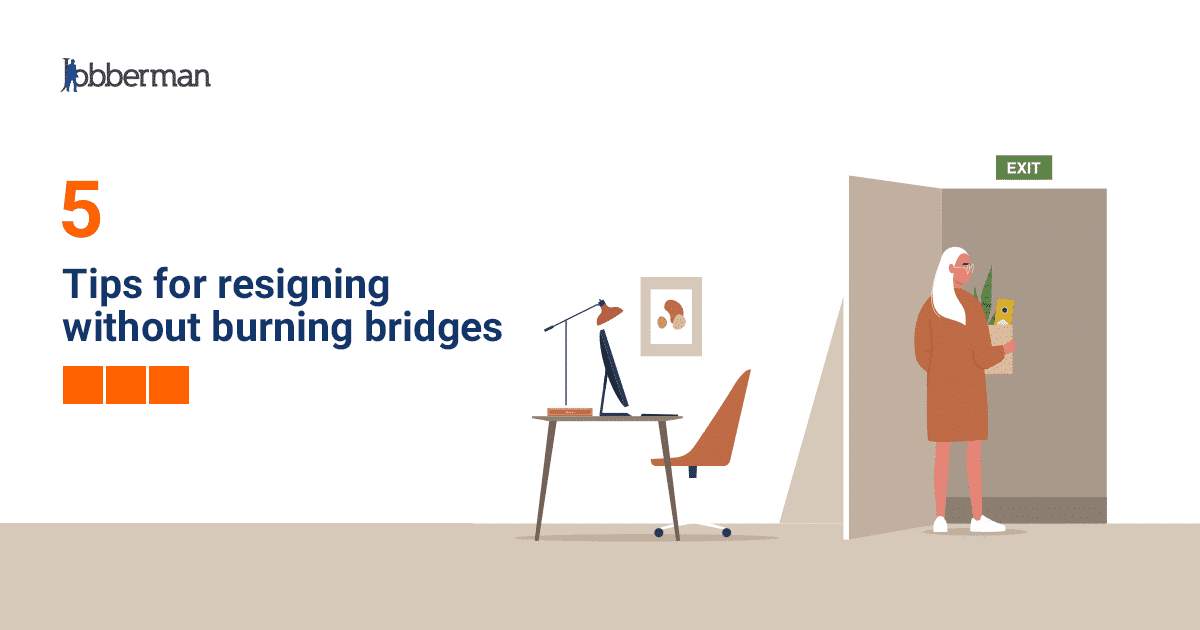So many times, you’ve fantasised about walking into your boss’ office and shouting “I quit”, what a feeling that would be. But hold that thought; this is going to come back and bite you. Maintaining a good relationship with your supervisor and co-workers after quitting is essential for protecting your reputation in the industry.
It’s a smaller world than you think, and you never know when you’re going to need these people again. The average worker today stays at a job for 4.6 years, according to the most recent data from the Bureau of Labor Statistics.
Whether you’re leaving because you can’t stand your boss or simply because you found a better opportunity, it’s essential to handle the situation as professionally as possible. To ensure you quit your job without burning any bridges, here are five essential tips –
Tell your supervisor first, not your colleagues – Leaving a company doesn’t mean everyone in your circle needs to know why, when, and where, especially your colleagues. Facing your manager in person is the most respectful way to leave your job. But you should also try to eliminate the element of surprise a resignation can produce. People don’t like surprises that trigger big changes in their day-to-day workflow, so before you randomly set up a meeting and abruptly tell your manager the unfortunate news, send them an email that simply states that you’d like to discuss your future with her.
Give the appropriate notice – This is standard job-exit etiquette, but some employees give less notice, leaving their employer scrambling to find a replacement. This is a sure way to burn that bridge and miss out on a much-needed recommendation. Every job contract includes the expected time of notice; it’s best to respect this notice and give your employer enough time to find a replacement unless you’re resigning for an urgent reason like health concerns or the loss of a loved one.
Be professional – Even if you’re not leaving on the best terms, don’t play the blame game. You don’t want to ruin your career by trash-talking your former colleagues or managers. No matter how pissed off you are at the company, your managers or your colleagues, you must be respectful when resigning, don’t be rude in your resignation letter or become lazy towards work during your notice period.
You should adhere to your boss’ instructions and carry out your duties even during your notice period. The right network of people can get you where you want to go and these relations are invaluable. Draft a solid handover note outlining all of your pending projects, your recommendations for wrapping them up, and specific employees you plan to brief on what you’ve got cooking.
Don’t take anything that doesn’t belong to you – Another important thing to do is to return all office belongings to the company, as they say, “give what belongs to caesar to caesar” .
Try and be helpful even after you leave your job – You’ve made excellent relationships at your former job so make yourself available and useful after you go to keep your network strong. Leave on good terms by offering to train your replacement and even still help once you are gone, you can be also reachable if your replacement needs to clarify anything or needs help generally.
Resignation Letter Writing Tips –
Don’t go into details – There’s no need to go into a lot of detail in your resignation letter – it’s most important to convey that you are resigning and when your last day will be.
Express gratitude – Remember to thank your employer for the opportunities you have been given during your tenure.
Offer assistance – Offer to help the company during the two-week/1 month transition. You might offer to train a new employee or send in a detailed handover note.
Ask any questions. This is also an opportunity to ask any questions about compensation or benefits, such as where or when you will receive your last paycheck. You should send the email to both your employer and to the Human Resources office. Human Resources will be able to answer these kinds of questions.
Resigning from your job doesn’t have to be war. Always remember that you aren’t doing anything wrong by wanting to advance in your career.
Need some help? Here’s a TEMPLATE for you to download. Click here
Looking to change career paths or are you just trying to break into the labour market? We’re here to help, visit www.jobberman.com/job-seeker/level-up/ to learn more about our amazing offers.
*Original article written by Eseosa Osayimwen*





